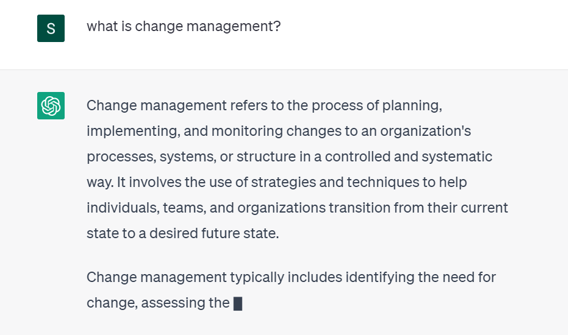How to become a change manager
Change management - a critical leadership skill?
Undoubtedly change management is a growth area. Over the last 2 – 3 years we have seen arguably the biggest global change in the modern era with the Covid pandemic. Every country, organisation and individual were affected in some way. Covid also hastened digital evolution with most organisations embracing video conferencing technology, if they weren’t using it before, to facilitate homeworking and now hybrid working. Who knows where technology will take us next, especially with things like the new AI tools like chatGPT and the impact that could have on jobs?

Another example of radical change is within the retail sector and the havoc that on-line shopping trends have brought about on the high street. The list of reasons for change includes the merry-go-round of organisational acquisitions and mergers that seem to be happening more and more. The list goes on and organisations simply must adapt to survive.
If you are considering a career in change management, there are a wealth of opportunities right now. In 2021 Forbes magazine published an article explaining why, in their view, change management is THE most critical leadership skill today, and in January 2023 LinkedIn published an article stating that there were some 450,000 change management jobs listed in the USA alone.
Let’s get a bit more specific and consider what careers are available in this space and how it’s possible to break into this arena. Whilst it’s the c-suite directors and senior managers who set the organisation’s direction and often take on a change sponsor role in critical organisational change, you don’t have to operate at that level to work in change. Organisational change happens one person at a time, so it filters down through organisations, affecting all job levels. Line / middle managers and project / programme managers all have a role to play in rolling out changes, and increasingly work with specialist change managers to do so. Change management is often seen as an important aspect of their roles (as mentioned by Forbes). Then there is the change agent role (sometimes referred to as change champions), which is how I got started in change before change was even recognised as a discipline.
Some 25 years ago, when working for a major UK insurer, I volunteered to get involved an organisation-wide culture change initiative. Not that the role of change agent was ever mentioned to us at the time, it was clearly what we were doing. It was a part-time thing, just a few hours a week so I also continued with my ‘day-job’ in IT.
What did the role entail and what were the benefits to me? In the first instance I was invited to a 2-day scene-setting conference and workshop, attended by 100’s of people from across the company (which numbered some 40,000 employees at the time). I now recognise the event as a world café style event, although I didn’t know that’s what it was called at the time. After the event I returned to my department and was tasked with running smaller local workshop events to elicit ideas from my peers on how the organisation could become a ‘best place to work’. I had to explain to peers in my BAU (Business as Usual) team what the vision of the initiative was, and then feedback suggestions, issues, and concerns to a local senior manager monthly.
What did I get out of doing this? Certainly, exposure to senior managers (that I wouldn’t have otherwise had access to), which was undoubtedly career enhancing. Thereon I had a much greater appreciation of my organisation’s strategy, organisational politics and how the hierarchy worked. Being a change agent is essentially a networking role that requires good communication and relationship building skills. Empathy and good active listening are important to encourage people to open-up, to properly probe and understand others’ concerns and maybe even support them or signpost them to organisational resources regarding the change.
Whilst I had previously run many workshops (so that wasn’t a new skill for me), it was for the majority of other change agents in the network, so they who developed new skills in this area. Whilst we weren’t given specific change agent training (it was some 25 years ago), more often than not, organisations nowadays do recognise the need to train their change agents. In turn, change agents may get involved in rolling out new systems and processes so they may be trained in delivering training themselves. Some other important skills that change agents may develop are around problem solving, creativity and teamworking.
Being an internal change agent can be a steppingstone towards becoming a change manager, or a specialist change agent contracting to different organisations. Some even refer to change experts as behavioural scientists.
If you are interested in getting involved in change as a career you can of course do as I did and try to get involved as a change agent if an opportunity arises. Of course, you may not want to wait for that as the opportunity may not arise. Meanwhile, there are qualifications available that can give you a head-start, such as APMG’s Change Management and PROSCI’s. These qualifications will give you things like an appreciation of different models of change that organisations may adopt, the emotional transition or journey that people make when confronted with change (which touches on human psychology), and tools for stakeholder identification and engagement.

